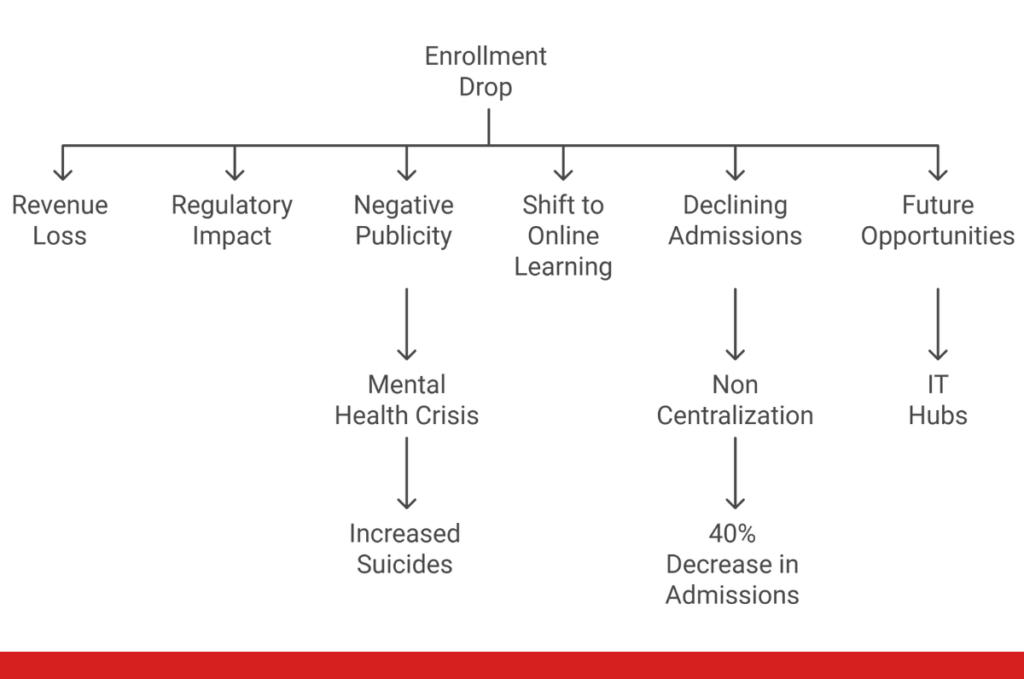In the heart of Rajasthan, a seismic shift is reshaping India’s most famous academic coaching hub. Kota, once synonymous with competitive exam preparation, now stands at a critical crossroads, facing unprecedented challenges that threaten its long-standing educational ecosystem.

The coaching industry’s traditional model is crumbling, driven by a complex interplay of regulatory changes, technological disruption, and growing societal concerns about student well-being. What was once a seemingly invincible educational powerhouse is now experiencing a profound transformation that extends far beyond simple enrollment numbers.
Table of Contents
Regulatory Pressure and Systemic Changes
The Rajasthan government has taken a bold step with the Coaching Centre (Control and Regulation) Bill 2024, signaling a significant intervention in the coaching industry’s operations. By introducing stringent regulations such as age restrictions and mandatory aptitude testing, policymakers are attempting to address long-standing concerns about student exploitation and mental health.
The bill’s most controversial provision – preventing students under 16 from enrolling – represents a direct challenge to the coaching industry’s traditional recruitment strategies. Stakeholders predict this could lead to a 30-40% further reduction in business, compounding the existing 40-50% enrollment decline.
Economic Implications for a One-Industry Town
Kota’s economic model has been deeply intertwined with its coaching ecosystem. Local businesses that have historically depended on student patronage are now facing an existential crisis. Shops, hostels, restaurants, and service providers are experiencing dramatic sales drops, with some establishments forced to shut down entirely.
This economic vulnerability exposes the risks of a monoculture economy entirely dependent on a single industry. The coaching hub’s potential decline threatens not just educational institutions, but an entire urban economic infrastructure.
Technology and Changing Student Preferences
The rise of online learning platforms represents more than just a technological trend – it’s a fundamental reimagining of educational access. Students now have unprecedented flexibility, with digital platforms offering personalized, affordable alternatives to traditional coaching centers.
This shift reflects broader changes in how younger generations approach education: valuing convenience, personalization, and mental health alongside academic achievement.
The Mental Health Dimension
Perhaps the most critical aspect of Kota’s transformation is the increasing focus on student mental health. The intense, high-pressure environment that once defined the coaching hub is now being scrutinized for its psychological toll.
Recent incidents highlighting student distress have prompted a broader conversation about the human cost of competitive exam preparation. Parents, educators, and policymakers are now demanding a more holistic approach that prioritizes student well-being over pure academic performance.
Looking Forward: Adaptation and Resilience
The current crisis need not spell the end for Kota’s educational ecosystem. Instead, it represents an opportunity for radical reimagination. Successful coaching centers will likely need to:
- Integrate mental health support into their programs
- Embrace technological innovation
- Develop more personalized learning approaches
- Align with evolving regulatory frameworks
The future of coaching in India will likely be more diverse, flexible, and student-centric than ever before.
Conclusion: A Turning Point
Kota’s transformation symbolizes a shift in mindset, reflecting broader changes in India’s approach to education. No longer the sole success story, it highlights the need for new ways of thinking. As Albert Einstein said, ‘We cannot solve our problems with the same thinking we used when we created them.



